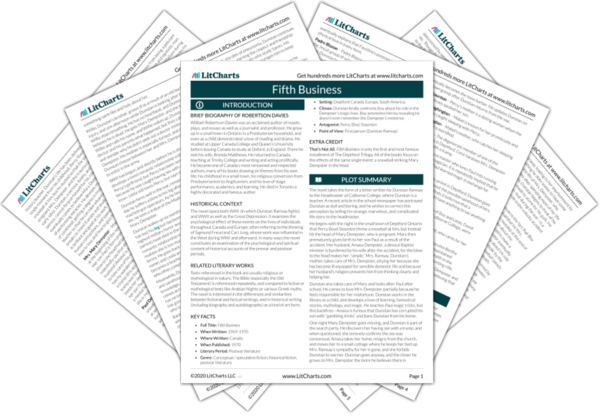But what most galls me is the patronizing tone of the piece—as if I had never had a life outside the classroom, had never risen to the full stature of a man, had never rejoiced or sorrowed or known love or hate.

Unlock explanations and citation info for this and every other Fifth Business quote.
Plus so much more...
Get LitCharts A+Can I write truly of my boyhood? Or will that disgusting self-love which so often attaches itself to a man’s idea of his youth creep in and falsify the story.
I had made her what she was, and in such circumstances I must hate her or love her.
Nobody—not even my mother—was to be trusted in a strange world that showed very little of itself on the surface.
In later life I have been sometimes praised, sometimes mocked, for my way of pointing out the mythical elements that seem to me to underlie our apparently ordinary lives.

I cannot remember a time when I did not take it as understood that everybody has at least two, if not twenty-two, sides to him.
I felt that everything was good, that my spirit was wholly my own, and that though all was strange nothing was evil.
We are public icons, we two: he an icon of kingship, and I an icon of heroism, unreal yet very necessary; we have obligations above what is merely personal, and to let personal feelings obscure the obligations would be failing in one’s duty.
She had fallen in love with me because she felt she had made whatever I was out of a smashed-up and insensible hospital case.
It was characteristic of Boy throughout his life that he was always the quintessence of something that somebody else had recognized and defined.
I was rediscovering religion as well…The Presbyterianism of my childhood had effectively insulated me against any enthusiastic abandonment to faith
I rather liked the Greek notion of allowing Chance to take a formative hand in my affairs.
“A fool-saint is somebody who seems to be full of holiness…but because he’s a fool it all comes to nothing…because it is virtue tainted with madness, and you can’t tell where it’ll end up.”
Now I should be able to see what a saint was really like and perhaps make a study of one without the apparatus of Rome, which I had no power to invoke. The idea possessed me that it might lie in my power to make a serious contribution to the psychology of religion.
Thus I learned two lessons: that popularity and good character are not related, and that compassion dulls the mind faster than brandy.
“What good would it do you if I told you she was indeed a saint? I cannot make saints, nor can the pope. We can only recognize saints when the plainest evidence shows them to be saintly.”
Why do people all over the world, and at all times, want marvels that defy all verifiable facts?...The marvelous is indeed an aspect of the real.
“Life is a spectator sport to you.”
“You make yourself responsible for other people’s troubles. It is your hobby.”
“It is not spectacular but it is a good line of work…Are you Fifth Business? You had better find out.”
The Autobiography of Magnus Eisengrim was a great pleasure to write, for I was under no obligation to be historically correct or weigh evidence.
Boy had always been fond of the sexual pleasure that women could give him, but I doubt if he ever knew much about women as people.
“You created a God in your own image, and when you found out he was no good you abolished him. It’s a quite common form of psychological suicide.”
“Come to Switzerland and join the Basso and the Brazen Head. We shall have some high old times before The Five make an end of us all.”











